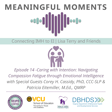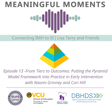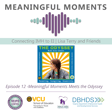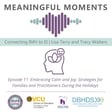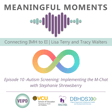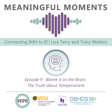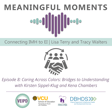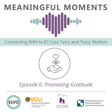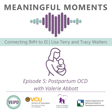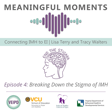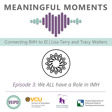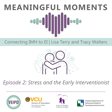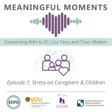Become a Creator today!Start creating today - Share your story with the world!
Start for free
00:00:00
00:00:01

Elevating IMH through Policy and Advocacy
In this episode, Andy Gomm joins Lisa and Tracy to discuss ways to elevate policy and advocacy efforts in infant mental health.
Visit https://veipd.org/main/index.html or https://www.vaimh.org/ for more information
This podcast is a collaborative effort from the Virginia Department of Behavioral Health and Developmental Services (through a contract with the Partnership for People with Disabilities/VCU).
Resources:
Briefing Paper and Planning Tool: Infant and Early Childhood Mental Health and Early Intervention (Part C): Policies and practices for supporting the social and emotional development and mental health of infants and toddlers in the context of parent-child relationships: https://ectacenter.org/topics/iecmh/iecmh-partc.asp
Transcript
Podcast Introduction & Collaboration
00:00:11
Speaker
Welcome everyone to meaningful moments podcast connecting infant mental health to early intervention. This podcast is a collaborative effort from the Virginia Department of Behavioral Health and Developmental Services and that is through a contract with a partnership for people with disabilities at Virginia Commonwealth University.
00:00:34
Speaker
My
Meet the Hosts & Their Roles
00:00:35
Speaker
name is Lisa Terry, and we are going to be talking about elevating infant mental health through policy and advocacy. So just to introduce myself, I am an Early Intervention Development Consultant at VCU, which is Virginia Commonwealth University, through the Partnership for People with Disabilities. I am also endorsed as an Infant Mental Health Mentor in Research and Faculty, and I co-facilitate the Division of Early Childhood Community of Practice,
00:01:04
Speaker
on infant mental health. So so excited to be here with you all today. I'm going to have my co host introduce herself. And then we'll have our very special guests introduce themselves. So Tracy, go right ahead. Yeah, thanks, Lisa. It's a pleasure to be here with you guys today. My name is Tracy Walters. I'm the state coordinator for infant and early childhood mental health. And I am endorsed as an infant family specialist as well.
00:01:30
Speaker
And I also am a co-facilitator of many parenting classes around this state. And I'm just so happy to work with Lisa on this podcast.
National Projects & Partnerships
00:01:38
Speaker
And we're so happy and excited about our guest for the day. That'd be Andy. Andy, you want to get yourself introduced.
00:01:46
Speaker
Well, thank you both for inviting me. This is a real pleasure. I'm a fan of the podcast and longtime listener, and I know a lot of people across the country are the same. So Andy Garm, I am the past director for Early Intervention in the state of New Mexico. I was the Early Intervention Part C director for a little over 20 years. And after leaving,
00:02:11
Speaker
that position, I've moved into consulting. And so I consult with a number of states around a variety of policy and practice issues. And one of the things we're going to be talking today is a project I did through the Early Childhood TA Center at the University of North Carolina.
00:02:29
Speaker
And so excited to be able to share some of those things and talk to two of my favorite people around infant mental health and how we can promote that across the country in early intervention. So thanks for inviting me.
00:02:43
Speaker
Thanks, Andy. Yes, we love geeking out with Andy and all things infant mental health and how we are just going to change the world, right? So I think, you know, let's talk first, Andy about so the way that we really got introduced to you is through a lot of the national work that you were doing through ECTA. So if you want to just kind of talk about a little bit more and explain in detail, what have you done nationally? What was that work group all about? And I think our listeners will be interested to hear that.
00:03:17
Speaker
So the project we did through the Early Childhood TA Center was really, even though it was housed and funded through the University of North Carolina at Chapel Hill, it really was a partnership. We couldn't have done it without national partners. And I think that you're going to hear that theme and some of the things I'm going to talk about is partnerships at the local
State-Level Policy & Practice
00:03:39
Speaker
level, partnerships at the state level. And so we really felt like we needed to do that at the national level. Think about who are the partners
00:03:39
Speaker
Yeah, thanks. Yeah, I love talking about it too.
00:03:46
Speaker
in infant and early childhood mental health that we needed to be working with. So natural partners were zero to three, a number of different programs at Georgetown University, the Alliance for the Advancement of Infant Mental Health. Another great partner was the National Center for Children in Poverty. So we brought all those folks, oh, and the pyramid model folks too.
00:04:12
Speaker
So we all came to the table to say, what is it we know about infant and early childhood mental health that really has relevance for early intervention. And so it was something like a 18 month project.
00:04:27
Speaker
really collaborative, rolling up the sleeves. And we didn't agree all the time, but we came to consensus on what are those things that we felt were really important for early intervention to be thinking about and really thinking of, we talked about it being a synergy.
00:04:44
Speaker
between these two sectors that both are working with very young children and their families. And so what can we learn? And we framed it in terms of two things, in terms of policies and practices. And we felt like, particularly on the policy side, what are those things that states particularly, and that's sort of our target audience, but if folks want to go to the early childhood TA,
00:05:13
Speaker
website and see the materials. I think there's a way to translate the things that we were talking about at the state level to if you're working at a regional or district level or even your local community level.
00:05:27
Speaker
And there are going to be some things at a policy level that you can't change at the local level, that Sony at the state level, those things can happen. So when we talk about policy, we're talking about regulations or written policy or guidance even. So we're using that term very broadly.
00:05:44
Speaker
And sometimes it's even statute, and sometimes it actually means passing a law to actually change something. So we're using that term broadly when we talk about policy. And then practices we're talking, which I think is a lot of the focus of this podcast has been, what does it actually look like when you're working with families to support that parent-child relationship? And I think the field is moving in that direction.
00:06:12
Speaker
you hear people talking a lot more about coaching and realizing it's working with that parent-child relationship. And so we really looked at the research and said, what are those things that
00:06:24
Speaker
we can do as a field to really enhance our work with families.
Innovative Practices & Tools
00:06:30
Speaker
And then how can we support both in professional development and things like reflective supervision and consultation? I'm a big proponent of that. I think we're doing ourselves a disservice if we're not supporting practitioners in the field with our ongoing regularly scheduled, whether it's group or individual, but reflective supervision and consultation. So it was a really robust,
00:06:54
Speaker
process the paper. We called it a briefing paper. It's not very brief. It's something like 70 pages long. But once we got into it, there was so much that we wanted to cover. And what we heard from the field, I think folks like yourselves who are passionate
00:07:11
Speaker
about infant mental health, infant and early childhood mental health. Maybe some folks were feeling maybe a little alone, like where are my peeps? And they saw this paper and they're like, wow, and now it's up on the national website. It's like, oh, there's a community out there that feels the same way, that feels like this is something we should be promoting in early intervention. And
00:07:35
Speaker
So once the paper was done, we were able to work with eight states and really support them in thinking about what are either the low-hanging fruit or the things that would be pretty easy to do, to put in place, and what would those things that, oh, we really want to change, say, our eligibility to include some of the
00:07:58
Speaker
diagnostic classification zero to five, some of those more social, emotional, mental health conditions that maybe aren't part of their established conditions list. That might be a bigger lift that might be depending on how the state has that. It could be a statute change, could be a regulation change that has to go out to public comment. You might be needing to bring some folks together to say, what are those conditions that as a state we would like to have on our list?
Virginia's Leadership in Infant Mental Health
00:08:27
Speaker
So we helped people think about how they could actually do that. So it's been a really exciting project. And I know you guys are doing some great things in Virginia and Tracy, with your lead in policy, not everyone has someone like you to lead such an effort. So hats off to Virginia for seeing that as a priority. But states that don't have either someone in your kind of position or even an association, and I think
00:08:57
Speaker
there's over 32, 33 states now that have an association of infant mental health. So there's definitely states where those partnerships are definitely there to think about what are those policies that they can work on.
00:09:11
Speaker
Yeah, Andy, I mean, it's so exciting hearing you talk about all of these pieces that fit so beautifully together, like when you talk about the national level and the state level, and then we look at the regional level, because it takes that lift, right, of all of those folks to really make meaningful difference for children and families and practitioners. And I know that
00:09:36
Speaker
you know, we're getting ready for General Assembly to start happening in Virginia, which is a really big opportunity for us. I mean, as state employee, I can, I'm hands off with that, but we are like really supporting people who can participate. And our Virginia Association of Infant Mental Health and our Executive Director, she is really on it. We're really, we've got some good packaging going out to support that effort.
00:10:03
Speaker
But also this whole idea, Andy, that you're talking about, about innovating, you know, integrating the advocacy in our normal day-to-day life and work, right? It doesn't just have to be at that general assembly, that one or two days that we get in there, but really this idea of integrating, you know, infant and early childhood mental health in early intervention and what that looks like.
00:10:30
Speaker
And I know that, you know, Lisa and her team, they're doing amazing work over at VCU and she and I get to collaborate a lot on projects, including this one. And it's a great way to like just get tied in with the community. And it's all about, when I think about the advocacy and policy, I consider it storytelling.
00:10:53
Speaker
And I really think when we're all familiar with young children and what is powerful for them to say for adults, it's creating those stories behind why this is so important. And I'm just wondering if you think about it in those terms as well. I absolutely do. And I would hope that people don't.
00:11:12
Speaker
go away from this podcast thinking that advocacy is only at the state level or even the national level. We love people telling their stories, coming to use case studies to say this has made a difference. But advocacy can be at the local level too. It can be taking something to your staff meetings,
00:11:32
Speaker
I've wondered about why we do this the way we do it, or I've heard about this, I've read about this. Could we consider making a change at our agency level or our district level? States are all set up very differently in how they administer early intervention, as I'm sure you know. And so yeah, I think bringing those advocacy things to staff meetings and say, could we do things differently? I absolutely agree with that.
00:12:01
Speaker
Yeah, I was just going to jump in and say to a lot of advocacy to me is awareness is creating that awareness because we have talked and talked and talked about this stigma on infant mental health and how a lot of even early interventionists, you know, they go to school and they don't always learn about that.
Training & Local Advocacy
00:12:18
Speaker
emotional well-being of families and the impact that it can have on them and even the impact it's going to end up ultimately having on that individualized family service plan and implementing those services and those parent-child interactions, right?
00:12:33
Speaker
And so a lot of it sometimes to me, it's just even modeling that awareness. And like you mentioned case studies, Andy, so if we're going to talk about those case studies, what is it that we're looking at? What is it from my perspective that I'm seeing? What are you seeing from your perspective? And having those conversations so that way people start to understand, Oh, wow, now I see how stress impacts this family. Now I see how
00:12:57
Speaker
those parent-child interactions might be reduced because they are just worried about getting their basic needs done or they have some other, that caregiver has some other greater mental health issues that they're dealing with themselves. And so we really want to also work on that awareness piece and modeling that too. Yeah, so I agree with that totally. And I think if you're that champion at your agency, you're making change within your agency. It may feel small when we're talking about
00:13:26
Speaker
you know, advocating at the regional, state, or national level, but those changes at your local level, maybe hearing your story or your case that you're bringing to the staff meeting, can be the difference that someone else on your team then goes, wow, I had never thought of things that way. That's going to really change my practice. But I think it can be other changes at the local level. One story I tell a lot is when we were promoting infant mental health way back in the mid 2000s, we
00:13:56
Speaker
We were encouraging folks to hire mental health people as part of their teams. And I had this one manager in a fairly rural area of New Mexico.
00:14:08
Speaker
And she was very reluctant. I think she was a speech therapist by discipline. And she just didn't see the value of having a mental health person as part of the team. And sometime later, it was like three or four years later, she came to me at a state conference and she said, Andy, I hired a family therapist.
00:14:29
Speaker
And it has changed our practice. Not only was that person then actually able to work with some of the families, not every family needs a therapist, but there was a few families. But she said it was having that person as part of the team that they were able to meet with people after visits. You know, when you come back from a visit and you're like, oh my gosh, the family disclosed this. I didn't know this is how I handled it, but I didn't know if I handled it well. And now I'm nervous about,
00:14:58
Speaker
going back the next week, how I should approach that. So having that mental health person as part of the team allowed for that natural reflection and consultation. And she said it just has changed back then changed the way that their whole agency. So, you know, she took a policy change, if you if you like to think of it as that as just hiring someone as part of the team.
00:15:24
Speaker
Yeah. And I think Andy, that kind of goes back to like what Lisa saying is this awareness piece, right? And this ECTA work that you did has been so inspirational nationally. And I will just say from Virginia,
00:15:39
Speaker
you know, we had a state leadership group, Lisa was involved with that to look at that information, really take a deep dive into that article and what we could do in terms of our state with that. It also was inspiration for reflective leadership group that I've created with early intervention to talk to local system managers. And we are doing case presentations and just trying to build more of this work into their daily practice. But the big nugget for us is we're starting to
00:16:08
Speaker
pilots in Virginia and two of our regions on reflective supervision in early intervention. And we are so excited about getting that rolled out in January. We're really excited to see like what that's going to look like. But, you know, go into this piece of what you're saying about the individual who was kind of against hiring, you know, a consultation person or an employee based on this.
Tools for State Self-Assessment
00:16:34
Speaker
You know, even when you're all for it, it's really determining how these folks will fit into what is already there, what is existing, and getting them built into the framework. And so, I mean, there's just so much that we could cover with you in a day, like all that you've inspired and your national partners have inspired for us. I know for Lisa and I at the state level.
00:16:59
Speaker
It's just, what you've already introduced is a lot. And I'm just wondering, how do states or communities know where to start? Like, we've got some ideas, we're projecting these projects, you know, Lisa's got a ton of stuff going on, I've got things going on, we're trying to collaborate together, but where would you say when we're looking at this advocacy and policy, where should we be starting?
00:17:23
Speaker
Yeah, that's a great question because as you know, part C lead agents is the directors particularly, but even their staff, their bandwidth is full, right, with all of these federal requirements and accountability and things. And so, yeah, it can be a little overwhelming where to start. One thing we did that we got good feedback on is we created a self-assessment, a
00:17:48
Speaker
a way for people to look at all of the recommendations that we had in the briefing paper, which to your point can be a little overwhelming. Where do we start? And so what we encourage states, but I think equally it could be districts or regions or even a local provider.
00:18:06
Speaker
network could actually go through that and say, where are we? Because maybe we don't even know what's going on, especially at the state level. Like, is there some reflective supervision going on in local areas that we actually didn't know about that we can learn from and build on?
00:18:23
Speaker
And so it's an assessment that allows people, and it's in words, so it can be adapted. There's not one exact right way to do things, but they can go through that and then through that process, working out what's going on in the state or what's going on in the region or what's going on in the local community, then start to prioritize and think about what are the things that would be pretty easy to do. We wanna start adding a mental health person to our assessment teams or our evaluation teams.
00:18:53
Speaker
where possible or when indicated. It's a CAPTA referral or child welfare. So we want to have someone on our team or we want to add a screening tool as part of our every state again is different in terms of what they mandate in terms of evaluation and assessment tools. Some leave that
00:19:12
Speaker
totally to the local folks to decide, others sort of mandated from the state level. But thinking about how could we add some way to look at and assess social emotional development as part of that. Professional development could be another area of, and I know you guys are doing some great work, particularly around social emotional development.
00:19:34
Speaker
is that something starting off we did in New Mexico, adding some folks to come to our national, national, our state conference and have folks present. So I think doing the assessment can really help you think about what are the things to prioritize and what might be the three to five year goals as opposed to, hey, we could get this done in six months. Lisa, you had something to add?
00:20:00
Speaker
Yeah, Andy, I actually, I really love the tool. And I love how detailed and thorough it is. So kudos to everyone that really worked on that, because it really does kind of just lay it out from everything that you could possibly want to think about and consider, What are our practices?
Access & Service Implementation
00:20:17
Speaker
How are we doing this now? And it really helps you, I think, to kind of identify what are your strengths.
00:20:23
Speaker
and what are your areas where you can really grow? What are your opportunities for growth, right? And looking at that. And I think even like sometimes it can be very overwhelming because you can look at it and say, oh, like there's so much, like where do we start? Where do we even begin? And I know like for us, it really helped us kind of look at, okay, well, what is our eligibility? What is our accessibility to services? What are the tools that we're using for assessment and services? And then what are the,
00:20:52
Speaker
What kind of service implementation are we doing? What is it that we're utilizing and how are we supporting those families? And so I think even to like just to start small and look at your priorities for each area is really important when we're thinking about this tool because it really does give us so much information.
00:21:10
Speaker
Yeah, I totally, and I would thank you for that endorsement. I think it's helpful too, because otherwise, where do you get started? And then who are your partners to work with? I mean, I wouldn't also want people to walk away from this thinking. This is all on early intervention, just as we modeled it at the national level. And I think you guys do a great job in Virginia. Who are the partners that you need to be working with? If it's reflective supervision and consultation, if it means training a cadre of people, well, that's needed across
00:21:40
Speaker
the early childhood sector. So can a cadre of people be trained and supported that could work not just in early intervention, but work in other sectors to professional development? Can that be offered for the different sectors? Hey, we'll develop this training module if you develop this. And I think working across instead of silos, I know our funding streams tend to be siloed, but I think
00:22:07
Speaker
We have the opportunity at the state, regional and local level to think about how can we braid some of those funding to get good results for children and families. Yeah, and Andy, I'm glad that you bring that, you know, that siloed effect up because I know in Virginia that is something we discuss a lot. And in terms of how do we break that down a little bit? And I really am always inspired when I'm sitting with people like you, Elisa,
00:22:37
Speaker
or other partners that I get to work with across the state who we kind of dissolve those by putting the children and families first. And we say, but what is for the good of the greater group? You know, what is for the good of all? And so that is one step we can take, right? And just as we talk about our personal advocacy, just being in those spaces and saying, I'm sure we can find a workaround. You know, I'm sure that we can barter some services. And I think that is really
00:23:08
Speaker
So telling in this work the buy-in and then really having that opportunity to say, let's get real about it. We can find a workaround and work together on these because the most important thing are the children and the families. And I think sometimes we can get really caught up in the processes, but it's especially important for us to say, but what is the why in this work?
00:23:32
Speaker
Yeah and so I think leaders like you really keep that in the forefront for us and it's very inspirational. Well thank you and the other avenue that I think it was very forward thinking when they created the IDEA law to have the Interagency Coordinating Council and right there you have folks coming together from the different centers and I'm not sure how many
00:23:58
Speaker
folks have mental health, folks on their ICC. But if you're sitting at the local level and you're passionate about something and you don't see anything going on in your state, I know this podcast is Virginia focused, but I know you have a lot of folks who tune in from across the country. And I think the ICC is a great venue to take folk, take issues to to say, hey, I'm passionate about infant mental health, and this is why and this is how I think
00:24:27
Speaker
and and have get it on the agenda your ICC you can I mean even if it's not a full agenda item there's usually a public input session.
Advocacy & Long-Term Change
00:24:37
Speaker
maybe that's the first step and then maybe the next meeting it might actually have an hour for people to hear a presentation and from that, who knows where it will go after that. So I think people undervalue or don't see that their voice on the Interagency Coordinating Council, maybe they're not a member, but they can still bring issues to the Interagency Coordinating Council to take that forward. So people have power to move things forward. I don't think they always see that.
00:25:07
Speaker
but we used to love having local folks come and bring an issue to us to listen to and then think about where we might take that. So we'd really encourage people to see that they have agency to make change.
00:25:24
Speaker
That's a great point, Andy. And I wanted to share an example of one thing that I was able to kind of push and move forward when I was a supervisor in a city locality. One of the things, obviously, you all know that infant mental health has always been very near and dear to my heart. And so I was supervising educators. And one thing that I really wanted was for everyone to go through the endorsement process. As we all know, sometimes funding is an issue, right?
00:25:52
Speaker
And so I had to submit and develop this whole proposal that I had to move forward and submit to our city leadership. And I, the whole time I'm sitting here thinking they're never going to approve this. There's no way that they're going to give me the funding for all of my educators to go through and get this endorsement.
00:26:15
Speaker
And goodness did they. They funded it. They fully supported it. And it was just so amazing to actually see that once you actually really plan and you're intentional about your purposes and what you want and you're advocating for it to city leadership and you're letting them know why this is important and why we should move forward with it.
00:26:35
Speaker
Sometimes it surprises you and you are able to get things done. And it was just so great that they were able to see the value of infant mental health and see the value of having endorsed professionals in infant mental health and supporting that fully with that city funding. It was just such a great thing, I think, to see. So I wanted to share that as just an example of what leaders can also do. Sometimes I know that you can go in thinking that this is never going to happen. They're never going to support it, but you never know until you do it.
00:27:06
Speaker
Yeah, and I love that story because I think it probably opened doors for other people. And another example would be if you made a change at your agency, you might think, well, that's not changing things for a whole state. But then maybe you do a presentation at your state conference and other people learn and go, wow, I didn't even know that was possible. Look what this one agency is now doing. Maybe we could do the same. So you never know the change that you're making, how it can.
00:27:34
Speaker
you know, be like a stone or a, it's winter, so a snowball that just grows. Just a little snowball. A little. I like the visual. I like it. So that change that you make at the local level can really open doors for other people or lead to more change across the state.
00:27:55
Speaker
And Andy, I think you're so right about that because at the state level, there are days I can be like, this is totally overwhelming. This is a whole state, people. This is not like a region. I am glad I have somebody like Tracy. I know some of that state stuff.
00:28:10
Speaker
I don't know. You can't do it without your partners. I lean heavily on Lisa and I'm just going to say friends like Lisa, colleagues like Lisa to really get the work done. But you're exactly right in that. I try to keep in my head when I come into my desk in the morning, it's like you just take the
00:28:29
Speaker
The next step that feels right. Just the next thing that feels right. The next best step, right? Because you can't like jump 10 steps. All you can do is say, okay, it's taken me two years to do this, but that's done. And now it's going to take me a couple years to do this. But I think you have to be in it when we're talking about policy and advocacy and infinite and early childhood mental health and integrating all those things. You have to be in it for the long game.
00:28:57
Speaker
It's about the long game, right? And that's where I think the advocacy and policy all comes together for me in my mind is that it's all about the buy-in, sharing the story and getting the buy-in. And I know that one of our next steps with our Virginia Infant Mental Health Association is like public-private partnerships. So now really going into
00:29:23
Speaker
the business district and saying, this is why infant and early childhood mental health and policies for young children is so important for your business. So what's the return on investment? Because sometimes we have to get in the community and talk about that. And that's a whole different, you know, brain from how some of us have been trained, but it's critical.
00:29:44
Speaker
Yeah, I love that concept of public private partnerships and I think as a field we don't look to those philanthropic organizations enough to think they're often looking for things to fund.
00:29:59
Speaker
I mean, I'm sure you, Tracy, look at a lot of funding issues in your position. And sometimes those philanthropic organizations are looking to fund. They're often not going to fund a program for the next 10, 20 years, but they are interested in funding short term pilots or
00:30:19
Speaker
putting something together, a training package, that otherwise maybe the state agency doesn't have the funding to do that. I mean, sometimes we get these injections of federal funding and can fund something new, and then that dries up and it's like, oh, we don't have any money to be creative with to create these new
00:30:38
Speaker
pilots or these new programs. But philanthropy, philanthropic organizations often love those, you know, put a 50,000 here, 75,000 there that for us, those can be, you know, game changers in terms of us trying something new. So I love that you're looking at those kinds of opportunities.
00:30:58
Speaker
And it's so important to invest in your community. Yeah. And we want those business partners to do that and see the reason for it because infant mental health is really one of those things to me that can move so far across time. And when you're thinking about really changing the future and the outcomes of these
00:31:18
Speaker
families and these children that we're serving, infant mental health is definitely the way to go because you are looking at that whole emotional well-being of the family itself as a family unit. You're not isolating and looking at just one factor. We're looking at it all and we're seeing the bigger picture. I think you're so right about that, Lisa. The thing is, is we're looking at communities in the future. We're not just looking at the community that we live in right now with our children, but
00:31:47
Speaker
These interventions, you know, I go at DBHDS, we're all about behavioral health and developmental services, and we have a lot of great services on board, but one of the things I talk about is we must get on the prevention and promotion side of things before we hit the crisis. We want to head that off, and this is the tool to do it.
Challenges & Opportunities in Mental Health
00:32:08
Speaker
This is the mechanism to do that.
00:32:11
Speaker
And so we will keep beating that drum. I know the three of us will do that. Am I right, Andy? Oh, absolutely. And I wanted to share that, you know, some of the pushback I do get is that people look at the IDEA because, you know, people are stretched, right? We know people, they're stretched in their work with families, they're stretched in meeting timelines and accountability.
00:32:34
Speaker
And it's like, don't add one more thing. It could be the thing that pushes me over the edge. And some people look to the IDEA, the Part C of Individuals with Disabilities Education Act, and say, I don't see that I have to do this thing called infant mental health or infant and early child. So why are you saying I have to do one more thing? I think one thing is we have to convince them. It's the right thing to do. You're actually serving your children and families better. And I think you guys demonstrate that so well in the work that you're doing in Virginia.
00:33:04
Speaker
I think also there is, in the IDEA, I think already there are things that we can look to. I would love the next time the reauthorization comes through. We don't know when that's gonna be. It was a number of years ago. It was last reauthorized. We don't know when it will be reauthorized. I'd love to see it strengthened the incremental health approach within the IDEA. But I think we can already look to the law to say that there are things in there. There are only five diagnoses that they,
00:33:34
Speaker
recognize or suggest that they're not by any means a definitive list, but severe attachment disorder is one of them. So way back in the 80s when they were looking at what kind of children do we think can benefit from early intervention, one of the few diagnoses they put there was a mental health diagnosis, which shows me that they're seeing those kids with those kinds of challenges, relational issues between the parents.
00:34:01
Speaker
The other one is people look at the array of services, the 17 services under IDEA, and they're like, well, I don't see mental health or infant mental health there. But there is a service, it's the least understood service in IDEA, and it's family training, counseling, and home visits. Well, family training, a lot of states have a parent training in all events.
00:34:24
Speaker
information center. And then home visits is more of a modality. It's a way of delivering. It's not really a service. So I hold on to the family counseling piece of that and say, look, right there in IDEA, it's saying that family counseling is part of, and some states have come to use that service to actually have a family counseling service fully as part of the IFSP. And so again, you have to kind of look
00:34:51
Speaker
within IDEA to say where is it supporting, what we want policy-wise to push forward. And I would love to see IDEA be strengthened next time. So people who are the skeptics might, you know, they wouldn't be able to say, well, it's not fully there in IDEA. Yes, it now is, five years from now, hopefully. And so that's my commitment to work on those kind of national issues.
00:35:14
Speaker
I love all the commitment that you have, Andy, too. I'm just going to also put in a plug for your LinkedIn. If you follow Andy Gong's LinkedIn, he is always promoting policies and what's just been released. And so that's kind of how I try to stay abreast of what's new and what's out there is just by following him. So that's definitely one. But as we are getting ready to close, Andy, too, I want you to just kind of like consider like thinking about so we really talked about
00:35:43
Speaker
policies and advocacy and leadership and administration looking at this planning tool. So let's think about how can practitioners use this planning tool and then if you have any other last thoughts on policy and advocacy to kind of wrap it up. Yeah, absolutely. This has been such a fun conversation. I'm sure we could speak for a couple more hours. I just would encourage people to take a look at the paper and think about the things that
00:36:09
Speaker
really resonate with them, things that they would love to see happening at their local agency or regional level, and then say, how could I be part of that change? How can I bring that to a staff meeting or have someone come in and do a presentation on that?
Building Coalitions & Networking
00:36:25
Speaker
Some change can't happen at the local level, so if it's not something that your agency can make change in, then maybe think about bringing it to the ICC.
00:36:35
Speaker
I would say don't look for your partners. Even if it's at your agency, is there someone else in your agency that thinks the same way you do and is excited about these things? Because it can be lonely if you're the only person. And I think there's power in people coming together to make change. So maybe they're not in your agency. Maybe they're in another county.
00:36:58
Speaker
And maybe the two of you bring something to the ICC together. So you have a partner to do. So I think working out who your partner is, and that might be a partner outside of early intervention too. It might be a mental health person in another sector. Well, I was gonna say Andy too. I'm just gonna jump in really quick and just also put this out there. And also they can join the division of early childhoods and fit mental health community or practice. Because what I found in facilitating that is that a lot of people are starting to network
00:37:28
Speaker
from outside of their seats too. And to get ideas, how are you using this? How are you implementing this program? Or what does this look like for you and make those connections? And I think that's really helpful too.
00:37:40
Speaker
just kind of seeing how other states are doing things. I love that. Yes. And I've sat in on a couple of those communities practice and I see that synergy going on. Oh, I love that idea. And I'm hoping that people can connect outside of that community practice to say, how did you do that in your community and get inspired by other people? So.
00:37:59
Speaker
Yeah, what is that term? I think it's Margaret Mead that says, never doubt that a small group of thoughtful, committed citizens can change the world. And that it really is the only thing that ever has. I love that quote, because I think that inspires us to come together, to work together for these kind of change. And again, change at the local level, change at the regional and state level. And we've started to even talk about at the national level.
00:38:24
Speaker
I just have to say thinking about the work that you do and then all our practitioners are doing in the field. I really just want to throw out that nugget that if it's not us, then who? I love that.
00:38:38
Speaker
If it's not us, then who will pick up that torch, right? So it is all of our role to really be invested in this. It just reminds me when you talk about the Margaret Mead, it just reminds me of that. If not, then who, if it's not us, so yeah.
00:38:56
Speaker
Yeah, because you can sit there being frustrated. Oh, change will never happen, but you can be part of that change.
Inspiration & Closing Thoughts
00:39:02
Speaker
And people at the state level I used to love as the state director would love to hear from people who had read about something or who had thought of a different way of doing things. It may not be possible, but let's hear and let's debate it. Let's think about how could that change come about. So yeah, I love that too. Great.
00:39:24
Speaker
Thanks Andy. Any other last thoughts Andy before we end today?
00:39:30
Speaker
Well, I'm just inspired by the work that you do in Virginia and the work that you do, Lisa, in professional development. You have such great resources, and I know you're so generous in sharing that. So if states, other states, are thinking about how to get started, I know professional development is a great place to start. And so many states are part of their state systematic improvement plan, looking at social emotional development.
00:39:56
Speaker
So professional development, I think, is a kind of a no brainer, like how it's not really policy, but it's helping support the system. It's a crucial system part. And then the advocacy and state systems work that you do, Tracy, I know not every
00:40:13
Speaker
state has someone in your position, although that's a policy goal that I think a number of states should have is someone to, because it isn't looking at infant mental health from just one sector, it's looking across a early childhood care and education system. So I think folks have a lot to learn from all the great work that you're doing in Virginia, but at the same time, I think the tool is helpful for thinking about
00:40:43
Speaker
What are the things that you can tackle? And some of those things can be small. Put someone on your agenda at your state conference to come. We did that. We had Deborah Weatherston and it just changed our world in New Mexico when she came to speak to us and she speaks with such clarity and easy to understand.
00:41:05
Speaker
how you wonder about the parent-child relationship and people were just blown away. And so something like that can be the first step because people are like, yes, we're on board. We want to learn more. So I think that's what the states can do and they can learn a lot from what Virginia is already doing.
00:41:26
Speaker
And from you as well. Yeah, yes, we just we are so excited to have you today and just your level of knowledge and your commitment to infant mental health and really advocating for all of the policy change. We just so appreciate everything.
00:41:44
Speaker
that you have done in this field to really further just the effort and the commitment in infant mental health. So thank you for being here today with us. We are going to go ahead and close up. So that is all for our episode today of Meaningful Moments, Connecting Infant Mental Health to Early Intervention. Thank you again to all our listeners and a huge thank you to Andy for being our guest speaker and joining us today. Thank you, Andy. So grateful.
00:42:11
Speaker
Yes, we appreciate it. Join us again next time and make sure that you are subscribed to our podcast on iTunes, on Spotify, Google Podcasts, or if you prefer the video version, we do have a video version that is available on our YouTube channel. For more information, visit the EIPD's website for resources, tools, and archived webinars that Andy was talking about, all those free resources you can access there.
00:42:38
Speaker
You can also visit VAME, which is Virginia's Association for Infant Mental Health, for additional resources. Thank you all so much. Have a great day. Thank you. Bye, guys.
